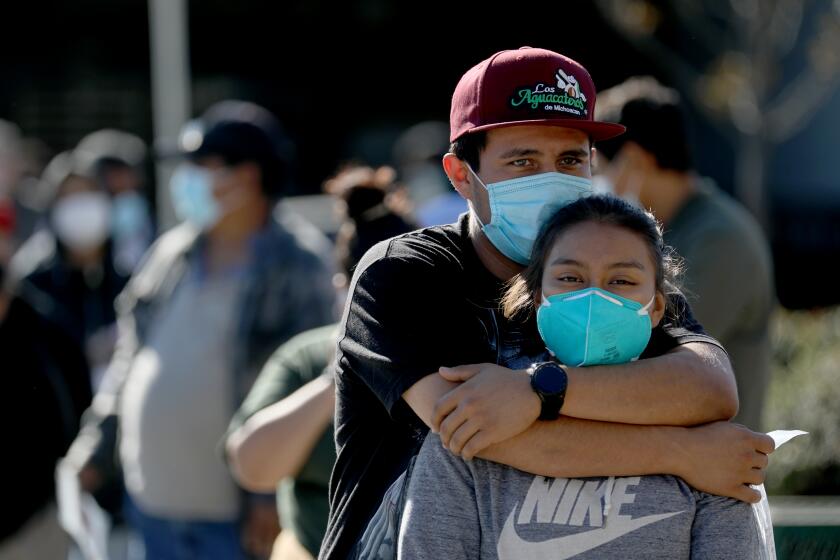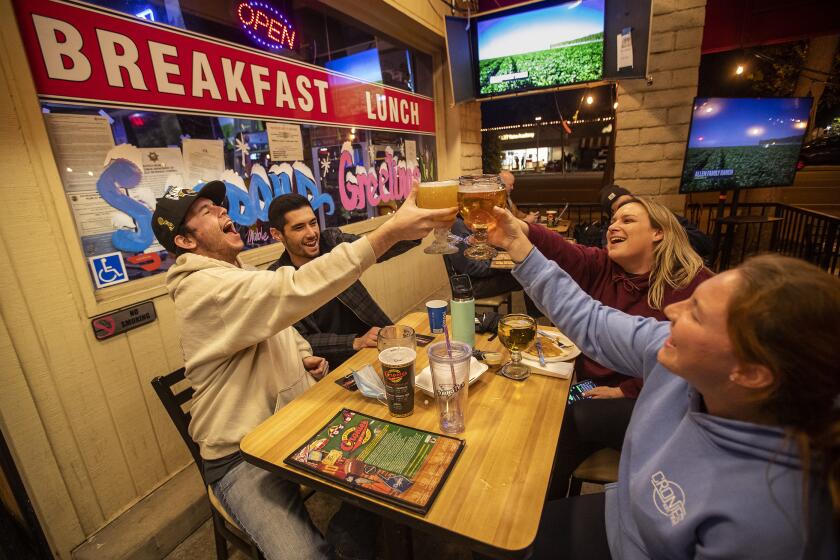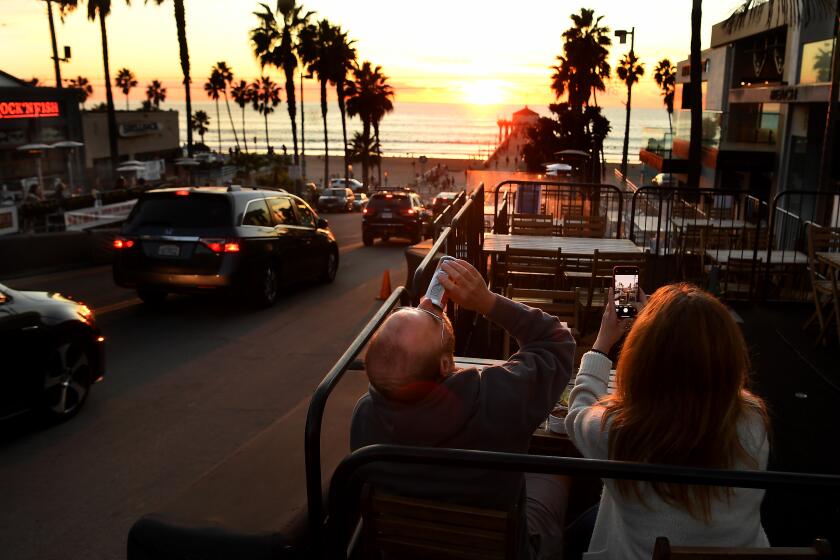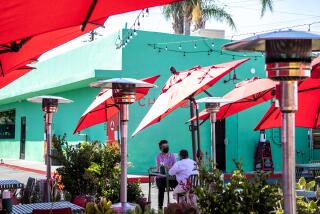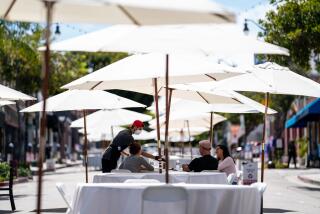L.A. restaurateur sues Newsom over outdoor dining ban

A Los Angeles restaurateur is suing Gov. Gavin Newsom in federal court, seeking to overturn a ban on outdoor dining implemented across vast swaths of California in an effort to slow the spread of the coronavirus.
The lawsuit was filed on behalf of the Pineapple Hill Saloon & Grill in Sherman Oaks. The owner, Angela Marsden, was seen in a viral video fighting back tears over the ban, which had forced the closure of her restaurant even as an outdoor dining area was set up by a Hollywood movie crew a short distance away.
The legal team, led by famed attorney Mark Geragos, seeks to overturn the ban, calling it an unconstitutional stretch of power by Newsom that is not supported by scientific evidence.
“The state health director admitted they had no data to support the outdoor closures, and the governor has obviously lost any moral authority due to his rank hypocrisy,” Geragos said, referring to Newsom’s dinner last month at the French Laundry.
“Meanwhile, L.A. County is the world epicenter of COVID because science isn’t driving the government decisions; lobbyists are,” Geragos said. “Tragically, tens of thousands of small businesses are the ones who pay the price.”
The state’s March restrictions flattened the coronavirus curve, but the latest order must tame an infection rate that is already wildly out of control.
The ban is part of a larger stay-at-home order implemented this month and is the latest in a series of attempts to slow the spread of the virus and prevent local healthcare systems from becoming overwhelmed with COVID-19 patients.
A series of restrictions, including a ban on outdoor dining, kicks in when a region’s intensive care unit capacity drops below 15%. Most Californians are now subject to the order. The availability of ICU beds reached 0% in Southern California on Thursday.
Two weeks ago, Geragos, who owns the downtown L.A. restaurant Engine Co. No. 28, and a team of lawyers for the California Restaurant Assn. convinced L.A. County Superior Court Judge James Chalfant that the county should not be allowed to continue the ban indefinitely.
A judge has ruled that once the L.A. County ban expires Dec. 16, public health officials must conduct a risk-benefit analysis to extend any closures.
In a rebuke of the ban a week later, the judge ruled Los Angeles County would need to provide a risk-benefit analysis to justify the restriction if it wanted to extend the ban beyond its initial three weeks, which ended Dec. 16.
The county immediately appealed that ruling.
Despite the L.A. County decision, Newsom’s state order prohibiting in-person dining remains in place, meaning outdoor dining will remain off-limits until at least Dec. 28, when the state rules will either expire or be extended. Outdoor dining had offered a lifeline to restaurants struggling amid the pandemic, which has affected more than 30,000 owners and their employees.
The latest lawsuit, filed on behalf of Case Ventures, which owns Pineapple Hill, says the governor’s executive order and public health order have left restaurant owners unable to “fully utilize ... leased property by serving dining opportunities to the general public.”
The lawsuit also names state Atty. Gen. Xavier Becerra and the state’s public health officer, noting the hypocrisy in which “a major Hollywood production was recently in full operation, where it had an outdoor tent set up and was permitted to serve meals to its team of employees and contractors” 20 feet from Pineapple Hill. California has deemed movie production an essential business.
“Defendants, in a gross abuse of their power, have seized the coronavirus pandemic to expand their authority by unprecedented lengths, depriving plaintiff and all other similarly situated small business owners in California of fundamental rights protected by the U.S. and California constitutions, including freedom of assembly and due process and equal protection under the law,” the suit states.
In a video highlighting the disparities, Marsden showed viewers her closed eatery next to the massive movie production.
“So this is my place, the Pineapple Hill Saloon & Grill. If you go to my [Facebook] page you can see all the work I did for outdoor dining, for tables being seven feet apart,” she says.
“I’m losing everything. Everything I own is being taken away from me, and they set up a movie company right next to my outdoor patio, which is right over here,” she continues. “And people wonder why I’m protesting and why I have had enough.... We cannot survive. My staff cannot survive.”
Geragos said Marsden’s restaurant, on Van Nuys Boulevard, has complied with rules to curb the spread of COVID-19, and in doing so, has “invested considerable time and resources into ensuring a safe and secure CDC-compliant workplace for its employees and patrons, including mandatory mask-wearing, socially distanced outdoor dining, sanitized surfaces after each patron use and temperature checks for employees.”
After months allowing such practices, the new ban upended the dining scene again.
Celebrity chef Guy Fieri and many others hate California’s outdoor restaurant ban. Here’s why some experts say it’s essential.
The suit argues that there is no scientific data that the virus is spread via outdoor dining and notes that grocery stores have seen “unprecedented rates of coronavirus infections making it likelier than ever that a co-worker or customer could be ill.”
The lawsuit said the Centers for Disease Control and Prevention on Nov. 18 advised that “outdoor dining may occur with relative safety at restaurants if precautionary measures are observed, including but not limited to, social distancing and mask-wearing by servers and by patrons.”
In addition to Los Angeles, Orange, Ventura and Riverside counties, the Southern California counties affected by the stay-at-home order that restricts outside dining based are Imperial, Inyo, Mono, San Bernardino, San Diego, San Luis Obispo, Santa Barbara and Ventura.
The San Joaquin Valley region covers Calaveras, Fresno, Kern, Kings, Madera, Mariposa, Merced, San Benito, San Joaquin, Stanislaus, Tulare and Tuolumne counties.
More to Read
Sign up for Essential California
The most important California stories and recommendations in your inbox every morning.
You may occasionally receive promotional content from the Los Angeles Times.
